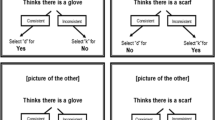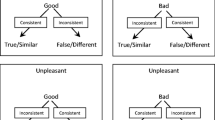Abstract
The current study aimed to design a preliminary implicit relational assessment procedure (IRAP) to measure the increased complexity and the flexibility in perspective taking (PT). Undergraduate students (N = 35) from a Spanish university completed a PT scale and a PT task (deictic relational task; DRT) that involved trials with different complexity (reversed and double reversed). Then, participants were asked to complete an IRAP to assess the level of complexity and flexibility involved in perspective-taking framing. Results showed that the IRAP captured the differences, on the one hand, in relational complexity when the participants were asked to respond saying Yes or No to their own perspective and, on the other hand, in relational flexibility when they were asked to change their own perspective. In addition, the IRAP effect correlated with high deictic ability as measured by the DRT (mainly in double-reversed trials). These findings suggest that the IRAP as designed in the present study seems to be a good indicator of complexity and flexibility in PT.





Similar content being viewed by others
References
Barnes-Holmes, D., Barnes-Holmes, Y., Hussey, I., & Luciano, C. (2016). Relational frame theory: Finding its historical and intellectual roots and reflecting upon its future development: An introduction to part II. In R. D. Zettle, S. C. Hayes, D. Barnes-Holmes, & A. Biglan (Eds.), The Wiley handbook of contextual behavioral science (pp. 117–129). New York, NY: Wiley Blackwell.
Barnes-Holmes, D., Barnes-Holmes, Y., Stewart, I., & Boles, S. (2010). A sketch of the implicit relational assessment procedure (IRAP) and the relational elaboration and coherence (REC) model. The Psychological Record, 60, 527–542.
Barnes-Holmes, D., Murphy, A., Barnes-Holmes, Y., & Stewart, I. (2011). The implicit relational assessment procedure: Exploring the impact of private versus public contexts and the response latency criterion on pro-white and anti-black stereotyping among white Irish individuals. The Psychological Record, 60, 57–66.
Bast, D. F., & Barnes-Holmes, D. (2014). A first test of the implicit relational assessment procedure as a measure of forgiveness of self and others. The Psychological Record, 64, 253–260.
Davis, M. H. (1983). Measuring individual differences in empathy: Evidence for a multidimensional approach. Journal of Personality and Social Psychology, 44, 113–126.
Expósito, P. M., López, M. H., & Valverde, M. R. (2015). Assessment of implicit anti-fat and pro-slim attitudes in young women using the implicit relational assessment procedure. International Journal of Psychology and Psychological Therapy, 15, 17–32.
Greenwald, A. G., Nosek, B. A., & Banaji, M. R. (2003). Understanding and using the Implicit Association Test: I. An improved scoring algorithm. Journal of Personality and Social Psychology, 85, 197–216.
Hadwin, J. A., Howlin, P., & Baron-Cohen, S. (2014). Teaching children with autism to mind-read: The workbook. Chichester, England: John Wiley & Sons.
Hayes, S. C., Barnes-Holmes, D., & Roche, B. (2001a). Relational frame theory: A post-Skinnerian account of human language and cognition. New York, NY: Plenum Press.
Hayes, S. C., Fox, E., Gifford, E. V., Wilson, K. G., Barnes-Holmes, D., & Healy, O. (2001b). Derived relational responding as learned behavior. In S. C. Hayes, D. Barnes-Holmes, & B. Roche (Eds.), Relational frame theory: A post-Skinnerian account of human language and cognition (pp. 21–49). New York, NY: Plenum Press.
Hughes, S., Barnes-Holmes, D., & Vahey, N. (2012). Holding on to our functional roots when exploring new intellectual islands: A voyage through implicit cognition research. Journal of Contextual Behavioral Science, 1, 17–38.
McHugh, L., Barnes-Holmes, Y., & Barnes-Holmes, D. (2004). Perspective-taking as relational responding: A developmental profile. The Psychological Record, 54, 115–144.
McHugh, L., Stewart, I., & Hooper, N. (2012). A contemporary functional analytic account of perspective taking. In L. McHugh & I. Stewart (Eds.), The self and perspective taking: Contributions and applications from modern behavioral science (pp. 55–72). Oakland, CA: Context Press.
Mckenna, I. M., Barnes-Holmes, D., Barnes-Holmes, Y., & Stewart, I. (2007). Testing the fake-ability of the implicit relational assessment procedure (IRAP): The first study. International Journal of Psychology and Psychological Therapy, 7, 253–268.
Mestre, V., Frías, M. D., & Samper, P. (2004). La medida de la empatía: análisis del Interpersonal Reactivity Index [The measurement of empathy: Analysis of the interpersonal reactivity index]. Psicothema, 16, 255–260.
O’Toole, C., & Barnes-Holmes, D. (2009). Three chronometric indices of relational responding as predictors of performance on a brief intelligence test: The importance of relational flexibility. The Psychological Record, 59, 119–132.
Power, P. M., Barnes-Holmes, D., Barnes-Holmes, Y., & Stewart, I. (2009). The implicit relational assessment procedure (IRAP) as a measure of implicit relative preferences: A first study. The Psychological Record, 59, 621–640.
Scanlon, G., McEnteggart, C., Barnes-Holmes, Y., & Barnes-Holmes, D. (2014). Using the implicit relational assessment procedure (IRAP) to assess implicit gender bias and self-esteem in typically-developing children and children with ADHD and with dyslexia. Behavioral Development Bulletin, 19, 48–59.
Törneke, N., Luciano, C., Barnes-Holmes, Y., & Bond, F. (2016). RFT for clinical practice: Three core strategies in understanding and treating human suffering. In R. D. Zettle, S. C. Hayes, D. Barnes-Holmes, & A. Biglan (Eds.), The Wiley handbook of contextual behavioral science (pp. 254–273). New York, NY: Wiley Blackwell.
Vahey, N. A., Barnes-Holmes, D., Barnes-Holmes, Y., & Stewart, I. (2009). A first test of the implicit relational assessment procedure as a measure of self-esteem: Irish prisoner groups and university students. The Psychological Record, 59, 371–388.
Vilardaga, R., Estévez, A., Levin, M., & Hayes, S. (2012). Deictic relational responding, empathy, and experiential avoidance as predictors of social anhedonia: Further contributions from relational frame theory. The Psychological Record, 62, 409–432.
Villatte, M., Monestès, M., McHugh, L., Freixa i Baqué, E., & Loas, G. (2008). Assessing deictic relational responding in social anhedonia: A functional approach to the development of theory of mind impairments. International Journal of Behavioral Consultation and Therapy, 4, 360–373.
Villatte, M., Monestès, J. L., McHugh, L., Freixa i Baqué, E., & Loas, G. (2010). Assessing perspective taking in schizophrenia using relational frame theory. The Psychological Record, 60, 413–436.
Wilson, K. G., & Luciano, C. (2002). Terapia de aceptación y compromiso: un tratamiento conductual orientado a los valores [Acceptance and commitment therapy: A values-oriented behavioral treatment]. Madrid, Spain: Pirámide.
Author information
Authors and Affiliations
Corresponding author
Ethics declarations
Compliance With Ethical Standards
All procedures performed in studies involving human participants were in accordance with the ethical standards of the institutional and/or national research committee and with the 1964 Helsinki declaration and its later amendments or comparable ethical standards.
Funding
This study was partly funded by Ministry of Science and Innovation funds, PSI2011-25497.
Conflict of Interest
Author Adrian Barbero-Rubio declares that he has no conflicts of interest. Author Juan C. López-López declares that he has no conflicts of interest. Author Dr. Carmen Luciano declares that she has no conflicts of interest. Author Nikolett Eisenbeck declares that she has no conflicts of interest.
Informed consent
Informed consent was obtained from all individual participants included in the study.
Rights and permissions
About this article
Cite this article
Barbero-Rubio, A., López-López, J.C., Luciano, C. et al. Perspective-Taking Measured by Implicit Relational Assessment Procedure (IRAP). Psychol Rec 66, 243–252 (2016). https://doi.org/10.1007/s40732-016-0166-3
Published:
Issue Date:
DOI: https://doi.org/10.1007/s40732-016-0166-3




